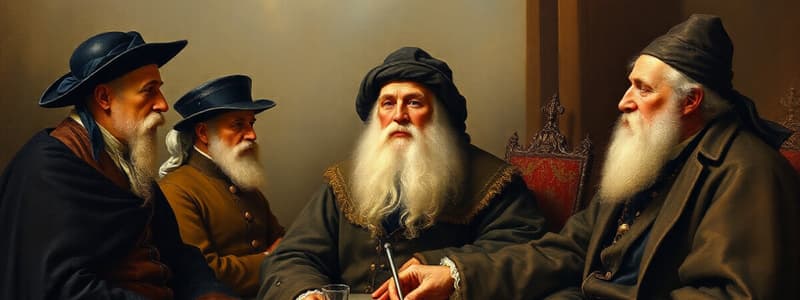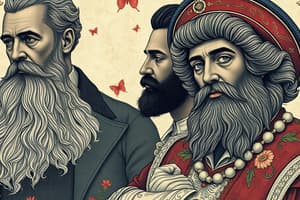Podcast
Questions and Answers
What theoretical advantage do lawyers bring to a revolution?
What theoretical advantage do lawyers bring to a revolution?
- Educating the masses
- Crafting legal frameworks (correct)
- Mobilizing armed resistance
- Developing military strategies
Which of the following is a risk associated with soldier-led revolutions?
Which of the following is a risk associated with soldier-led revolutions?
- Potential for authoritarianism (correct)
- Disconnection from grassroots struggles
- Overemphasis on civilian support
- Lack of strategic acumen
How do teachers contribute to the success of a revolution?
How do teachers contribute to the success of a revolution?
- By shaping ideology and educating the masses (correct)
- By formulating constitutions
- By providing military leadership
- By negotiating treaties
Which example highlights the role of lawyers in revolutionary contexts?
Which example highlights the role of lawyers in revolutionary contexts?
What is a commonly noted weakness of lawyers in revolutionary movements?
What is a commonly noted weakness of lawyers in revolutionary movements?
Which aspect is highlighted as a strength of soldiers in revolutions?
Which aspect is highlighted as a strength of soldiers in revolutions?
Chen Hongmou’s emphasis on moral education illustrates the impact of which group in revolutionary movements?
Chen Hongmou’s emphasis on moral education illustrates the impact of which group in revolutionary movements?
Which revolutionary leader is associated with military leadership as a key factor in revolution success?
Which revolutionary leader is associated with military leadership as a key factor in revolution success?
What is a key strength of poets in the context of revolutions?
What is a key strength of poets in the context of revolutions?
What is one major weakness of teachers in revolutionary contexts?
What is one major weakness of teachers in revolutionary contexts?
How did slaves demonstrate their capacity for leadership in revolutions?
How did slaves demonstrate their capacity for leadership in revolutions?
What role do lawyers play in revolutions according to the content?
What role do lawyers play in revolutions according to the content?
What did La Marseillaise exemplify in revolutionary movements?
What did La Marseillaise exemplify in revolutionary movements?
What is a primary challenge faced by slave-led revolutions?
What is a primary challenge faced by slave-led revolutions?
In successful revolutions, which groups tend to collaborate for better outcomes?
In successful revolutions, which groups tend to collaborate for better outcomes?
How do teachers contribute to revolutionary movements?
How do teachers contribute to revolutionary movements?
What is the importance of collaboration among roles in revolutions?
What is the importance of collaboration among roles in revolutions?
Which statement accurately represents the synthesis of roles in revolutions?
Which statement accurately represents the synthesis of roles in revolutions?
Flashcards
Lawyer's Role in Revolution
Lawyer's Role in Revolution
Lawyers help create legal frameworks, articulate rights, and legitimize revolutionary actions. They translate revolutionary ideals into laws and constitutions, ensuring institutional continuity.
Thomas Jefferson's Influence
Thomas Jefferson's Influence
Jefferson used his legal expertise to write the Declaration of Independence, establishing the intellectual foundation for the American Revolution.
Madison and Institutional Stability
Madison and Institutional Stability
Madison's Federalist No. 10 advocated for institutional mechanisms to prevent factionalism and preserve the revolution's ideals.
Soldier's Role in Revolution
Soldier's Role in Revolution
Signup and view all the flashcards
Toussaint L'Ouverture's Leadership
Toussaint L'Ouverture's Leadership
Signup and view all the flashcards
Teachers and Revolutionary Ideology
Teachers and Revolutionary Ideology
Signup and view all the flashcards
Chen Hongmou's Emphasis
Chen Hongmou's Emphasis
Signup and view all the flashcards
Potential Drawback of Military Leadership
Potential Drawback of Military Leadership
Signup and view all the flashcards
Rousseau's Social Contract
Rousseau's Social Contract
Signup and view all the flashcards
Revolutionaries: Teachers
Revolutionaries: Teachers
Signup and view all the flashcards
Revolutionaries: Poets
Revolutionaries: Poets
Signup and view all the flashcards
Revolutionary Weakness: Poets
Revolutionary Weakness: Poets
Signup and view all the flashcards
Revolutionaries: Slaves
Revolutionaries: Slaves
Signup and view all the flashcards
Revolutionary Strength: Slaves
Revolutionary Strength: Slaves
Signup and view all the flashcards
Revolutionary Weakness: Slaves
Revolutionary Weakness: Slaves
Signup and view all the flashcards
Collaboration in Revolutions
Collaboration in Revolutions
Signup and view all the flashcards
Revolutionary Success Factors
Revolutionary Success Factors
Signup and view all the flashcards
Revolutionary Roles: Lawyers
Revolutionary Roles: Lawyers
Signup and view all the flashcards
Study Notes
Revolutionary Leaders and Success
- Different groups bring distinct strengths to revolutions, influencing their success. Lawyers, soldiers, teachers, poets, and slaves all have various attributes and limitations.
Lawyers
- Strengths: Expertise in creating legal frameworks, articulating rights, and legitimizing actions. They translate revolutionary ideals into laws, ensuring institutional continuity. Examples include Thomas Jefferson and James Madison.
- Weaknesses: May overemphasize legalities and theory, potentially disconnecting from the grassroots.
Soldiers
- Strengths: Discipline, strategic acumen, and ability to mobilize armed resistance, crucial for regime overthrow. Examples include Toussaint L'Ouverture in the Haitian Revolution.
- Weaknesses: Military-led revolutions can become authoritarian, prioritizing order over revolutionary ideals, as evidenced by the Reign of Terror.
Teachers
- Strengths: Shape ideology, spread revolutionary ideas, educate the masses, ensuring broad support. Examples include figures who promoted moral education.
- Weaknesses: Lack direct power to execute a revolution without collaboration, their influence is indirect.
Poets
- Strengths: Inspire revolutionary fervor through emotional appeals and cultural identity, rallying the masses. Examples include poets who celebrated revolutionary figures.
- Weaknesses: Lack practical skills for organization or leadership, more effective as supporters.
Slaves
- Strengths: Unparalleled moral authority and strong stake in revolutionary outcomes, demonstrate the power of overthrowing entrenched oppression, like Toussaint L'Ouverture's Haitian Revolution. Their leadership significantly impacts the future.
- Weaknesses: External resistance and challenges to establishing stable post-revolutionary governments due to resource limitations and lack of experience in governance.
Revolution Success Factors
- Successful revolutions often involve a combination of strengths from these groups. American and French Revolutions exemplify collaboration.
- Lawyers: Institutionalize change
- Soldiers: Achieve immediate goals.
- Teachers and poets: Intellectual and cultural groundwork.
- Slaves: Dismantle oppression but with subsequent challenges establishing governments.
General Revolutionary Insights
- Revolutions need a balance of ideology, practical action, and broad support to succeed. Collaboration amongst diverse groups is key.
Studying That Suits You
Use AI to generate personalized quizzes and flashcards to suit your learning preferences.
Description
Explore how different leaders such as lawyers, soldiers, and teachers contribute uniquely to the success of revolutions. This quiz examines their strengths and weaknesses using historical examples. Understand the diverse roles that various groups play in shaping revolutionary movements.




